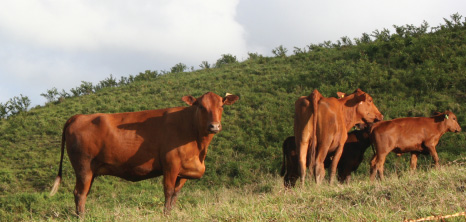Barbados moved swiftly to heighten biosecurity after veterinary officials warned on Thursday that an aggressive livestock parasite, the New World screwworm fly, is spreading across the Caribbean and threatens to devastate local herds if it reaches the island, Barbados TODAY has learnt.
The Veterinary Services Department, which regulates animal health through surveillance and disease control, raised serious concerns about the potential incursion of the fly, recently detected in Mexico as well.
“It is a concern for us because it’s spreading regionally. It was confined to Colombia . . . and there are a couple of Caribbean islands that have it,” Chief Veterinary Officer Dr Mark Trotman told Barbados TODAY. “It’s not an uncommon pest for the region. But Barbados has always been free of it; so, we are on high alert to make sure it doesn’t come in. But there is no risk of importing meat from the United States where that is concerned,”
However, Dr Trotman did not rule out the possibility of banning livestock imports from countries where infestations are widespread.
“I don’t have any plans on banning importation [of livestock] because of the fly right now, because we already have our own normal health requirements. So unless it gets out of control and the risk is much greater than it is now, in which case we will reassess and restrict accordingly. We will make sure we strengthen our biosecurity measures at the borders, and make sure that the import requirements are properly respected when animals are certified to enter Barbados.”
The New World screwworm is a parasite affecting all animals including humans, and is transmitted via its larvae.
“The risk of entry into Barbados is through live animals and the larvae, not products,” Dr Trotman explained. “So, there is no risk [from] importation of beef or pork or meat; there is no risk for importing those products from the United States. However, we are on the alert, when it comes to importing live animals to make sure the animals do not carry the parasite with them.”
Heallth certification and examination are required to ensure that animals are not carrying larvae, or originating from areas of concern, he added.
“And then upon entry, the animals are carefully inspected to see if there are any open wounds or any swellings or any signs of them having the larvae or the fly with them. So, it is a concern for us because it is spreading regionally.”
Asked about procedures if an animal arrived harbouring an infestation, he said: “We will treat the animal. We are not going to deny entry or kill the animal or anything so. The larvae are easily treated by medication, by sprays and things like that. So, we would quarantine it [the animal], treat it to make sure the larvae and the fly . . . there are no flies around; and once we are satisfied that these have been destroyed, then we will release the animal.”
Focusing on the potential impact of screwworm on the island’s livestock sector, he emphasised its threat: “If any animal is not properly attended to; if it has cuts and flies lay their larvae on the animal’s skin, or wound . . . I am sure you have seen in the past, maggot infested wounds in some animals and the effects that that has. Now imagine that by ten times and then you would understand what would happen if the screwworm gets out of control in Barbados.”
Source - https://www.stvincenttimes.com













